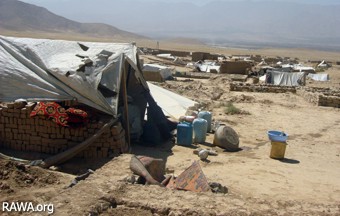Shops and mud-huts owned by Afghan refugees in Jalozai refugee camp in Pakistan's North West Frontier Province have been demolished and refugees who still live there have been ordered to vacate the area by the end of April, according to Pakistani officials and the UN Refugee Agency (UNHCR).

RAWA: A newly established refugee camp 60 km away from Kabul city where hundreds of families live in hell like conditions. These are Afghans expelled from Pakistan and Iran 6 months ago and still have no access to clean water and live on only bread. As the winter approaches, fear of a human catastrophe comes in at the door of every one of these poor residents.
"Most of the shops in Jalozai's main bazaar have been demolished, except for the few shops owned by Pakistanis," Nader Farhar, a UNHCR spokesman, told IRIN in Kabul on 22 April.
"Vacated clusters [settlements] of the refugee village have been demolished, but not the areas that are still inhabited," he said.
The repatriation of Afghan refugees and the bulldozing of their properties in the Jalozai refugee village started at the beginning of April, according to a previous agreement between the UNHCR and the governments of Afghanistan and Pakistan.
The closure of the camp, where some 80,000 refugees lived, was scheduled to take place in September 2007, but aid agencies had demanded a six-month suspension due to extremely cold winter in Afghanistan.
Waqar Zeb, an official in the Afghan Refugee Commission in Peshawar, said Jalozai was expected to be shut down completely by 15 April, but the process had been delayed because some refugees had resisted vacating the area.
"Now we have decided to finish the job by 30 April," Zeb said.
Reluctant to return
The worsening security situation in Afghanistan, the lack of job opportunities and limited access to land are among the factors which have increasingly discouraged some Afghan refugees in Pakistan and Iran to repatriate, according to several research papers by the Afghanistan Independent Human Rights Commission and the UNHCR.
Pakistan hosts about 2.4 million Afghans who are allowed to stay there until December 2009.
Registered refugees leaving Jalozai can either voluntarily return to their home country or move to already designated areas in Pakistan, UNHCR said.
However, many refugees slammed the Jalozai closure saying both options - return to Afghanistan or relocation in Pakistan - were detrimental to them.
"They've destroyed our houses and shops, and now they tell us to go and build new ones - it's inhumane and ridiculous," said an elderly refugee, Zaman Gul.
"We're destitute refugees and cannot afford to build new houses or make a living somewhere else," cried another man.
Others said they could not return to Afghanistan due to insecurity, land problems and lack of employment opportunities.
According to the UNHCR, over five million Afghans have returned to their homeland since the fall of the Taliban regime in 2001.
The UNHCR pays up to US$100 per person to refugees who voluntarily return to Afghanistan - an incentive not available for refugees who prefer relocation inside Pakistan.
Over 6,000 Afghan refugees have repatriated from Jalozai since March 2008, while at least 38 families have said they want to move to a refugee village in Mianwali, in Pakistan's Punjab Province, the UNHCR said.



